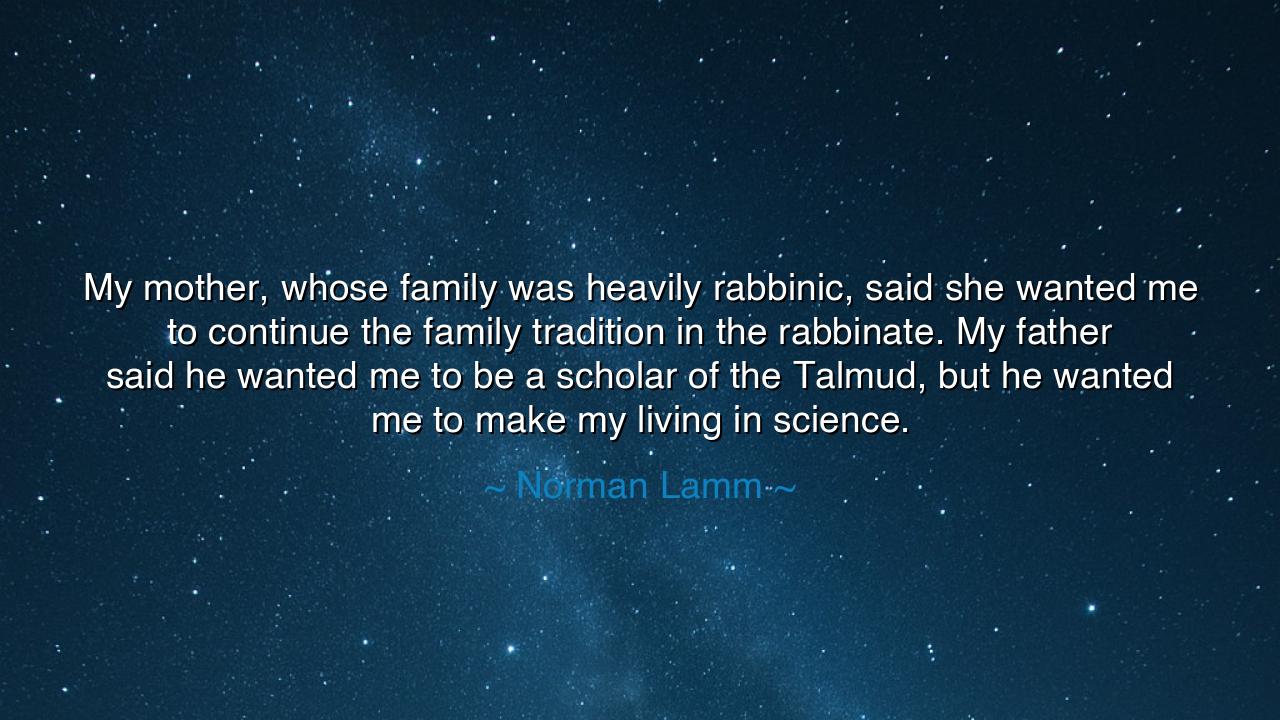
My mother, whose family was heavily rabbinic, said she wanted me
My mother, whose family was heavily rabbinic, said she wanted me to continue the family tradition in the rabbinate. My father said he wanted me to be a scholar of the Talmud, but he wanted me to make my living in science.






Listen, O children of wisdom, to the words of Norman Lamm, who speaks of the profound tug-of-war between the ancient traditions of the rabbinic world and the modern world of science. He said, "My mother, whose family was heavily rabbinic, said she wanted me to continue the family tradition in the rabbinate. My father said he wanted me to be a scholar of the Talmud, but he wanted me to make my living in science." These words echo with the weight of a legacy, a deep connection to both faith and reason, and the struggle that often exists between the teachings of the past and the demands of the future. In Lamm’s story, we see a profound dilemma—one that many throughout history have faced—of balancing the call of tradition with the pull of innovation, the ancient wisdom of faith with the burgeoning possibilities of science.
In the ancient world, the conflict between the spiritual and the rational was often expressed in the lives of the great thinkers and philosophers. Socrates, for example, was both a man of reason and a man deeply concerned with the moral and spiritual wellbeing of his city. He taught that true wisdom was the understanding of one’s own limitations, and yet, his life was also deeply intertwined with the spiritual beliefs of his time. Similarly, in the early Jewish tradition, the Talmud was not merely a scholarly pursuit; it was a way of living, a guiding set of rules for how one should approach life with holiness, righteousness, and meaning. To follow in the footsteps of one’s ancestors was considered an honor, yet the pursuit of wisdom often led to questions that transcended the rituals of tradition, pushing individuals to seek deeper truths.
Consider the example of Maimonides, one of the greatest Jewish scholars, who, like Lamm, stood at the crossroads of faith and reason. Maimonides wrote extensively on both the Talmud and philosophy, reconciling the wisdom of Torah with the teachings of Aristotle and other ancient philosophers. He understood that faith and reason were not opposites but could exist side by side, each offering valuable insights into the human condition. Maimonides believed that one could engage in the study of science and philosophy while still remaining faithful to the spiritual teachings of Judaism. His life’s work was a testament to the idea that spiritual tradition and intellectual pursuit could coexist, much like the two influences in Lamm’s life—the call to be a rabbi and the call to be a scientist.
In our time, Lamm’s words reflect the tension that many face as they navigate the traditions of their ancestors with the demands of the modern world. Just as Socrates challenged the Athenian views of the gods while still engaging in the spiritual life of his people, and just as Maimonides sought to integrate the wisdom of reason with the teachings of faith, so too must we find a way to honor both our heritages and our future. The spiritual and the intellectual are not separate pursuits but are part of the human journey, and it is up to each individual to find a way to walk both paths with honor, purpose, and dedication.
Lamm’s story teaches us a powerful lesson about the nature of legacy and choice. The path laid before him by his parents was not one of easy answers or simple decisions. His mother wanted him to carry forward the family’s rabbinic tradition, while his father sought a balance, desiring both scholarship and science. This dual legacy is a reflection of the duality that exists within all of us: the desire to preserve the wisdom of the past while also embracing the possibilities of the future. Just as Maimonides embraced both the Talmud and philosophy, so too must we learn to integrate our faith and reason, our heritage and our future, as we navigate the challenges of the modern world.
O children, take heed: the balance between tradition and innovation is not an easy one to achieve, yet it is one of the most powerful challenges of human life. Lamm shows us that both faith and reason have their place in our hearts and minds. The study of the Talmud can coexist with the study of science, and the call of tradition need not silence the pursuit of knowledge. Just as Maimonides taught us to engage with both the spiritual and the intellectual, you too must find your own way to honor the wisdom of your ancestors while embracing the opportunities of the future.
Remember, O children, the journey of life is not a linear path. It is a path of choice, of balance, and of understanding that the past and future are intertwined in ways that shape who you are. The pursuit of wisdom, whether it comes from faith, reason, or science, is the truest form of human growth. As you walk the path of life, seek not to separate these influences but to harmonize them, just as Lamm learned to embrace both the wisdom of his family tradition and the call to science. Let their example be your guide, and may your own life be one of integration, where the spiritual and the intellectual work together to create a life of meaning, purpose, and contribution.






AAdministratorAdministrator
Welcome, honored guests. Please leave a comment, we will respond soon